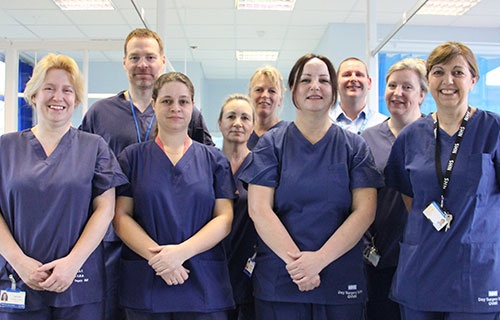Two podiatric day surgery quality improvement projects have resulted in fewer cancelled operations and a reduction in the risk of post-operative infections.
The team’s blood pressure project and their subsequent blood glucose project have resulted in benefits to both patients and the department. And due to their success they are now embarking on a third quality improvement project to improve their home visiting service.
The blood pressure project addressed last minute cancelled operations, which caused inconvenience and upset to patients and wasted theatre and clinician time.
Quality improvement methods were used to establish why on-the-day cancellations happened and what could be done to prevent them. The project involved process mapping and looking at national guidance before establishing a new protocol for all staff to follow.
Simon Pendleton, Quality Improvement and Podiatric Surgery Manager at the Queen Victoria Memorial Hospital in Herne Bay and Consultant Podiatric Surgeon Felix Lopez found that making the patient pre-assessment more robust and all staff following the same guidelines would bring results – with the rest of the team in agreement.
Simon said: “If in the pre-assessment blood pressure is too high then we will not schedule the patient for surgery. We would instead refer them back to their GP. We have now set precise levels, whereas before there had been some variance, with different surgeons making different decisions.
“Our blood glucose project has been quite similar. There are optimum levels and if blood glucose is too high this increases the risk of post-operative infection. We now have formal guidelines which make it very clear when we would put off surgery – and everyone is doing the same and working to the same advice, which works much better.”
The team’s third project is to make the home visiting service better by ensuring visits are not missed and improving staff handover.
Simon said: “We are working on this now to tighten up the processes already in place. We are mainly clinic based but an analysis of the service, using quality improvement principles, has found that when it comes to home visits teams in various parts of the county were working differently. We are looking to see if there is a standard process we can implement – although we understand that one size doesn’t fit all – taking into account that geographically each area is very different. In some areas visits might be very spread out, for example.
“We’ve done some process mapping and I am now working on a Standard Operating Procedure (SOP). We will undertake Plan, Study, Do, Act (PSDA) cycles next in each area to ensure the process works for them and then we can share any successes or failures that we can all learn from with other teams. It’s a project in progress and will take time. We’re looking at what works well and what doesn’t work so well.
“We will not end up with a one size fits all, but it would be good to get a base process and slot in local variances. The aim is to avoid missed visits and to improve staff handover.”


